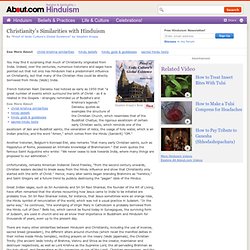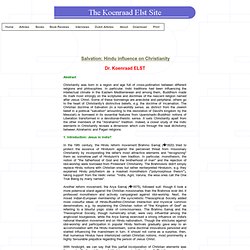

Christianity's Similarities with Hinduism - by Stephen Knapp. You may find it surprising that much of Christianity originated from India.

Indeed, over the centuries, numerous historians and sages have pointed out that not only has Hinduism had a predominant influence on Christianity, but that many of the Christian rites could be directly borrowed from Hindu (Vedic) India. French historian Alain Danielou had noticed as early as 1950 that "a great number of events which surround the birth of Christ - as it is related in the Gospels - strangely reminded us of Buddha's and Krishna's legends.
" Danielou quotes as examples the structure of the Christian Church, which resembles that of the Buddhist Chaitya; the rigorous asceticism of certain early Christian sects, which reminds one of the asceticism of Jain and Buddhist saints; the veneration of relics, the usage of holy water, which is an Indian practice, and the word "Amen," which comes from the Hindu (Sanskrit) "OM. " Continued to Page 2 >> Salvation: Hindu influence on Christianity. Salvation: Hindu influence on Christianity Dr.

Koenraad ELST Abstract Christianity was born in a region and age full of cross-pollination between different religions and philosophies. In particular, Indic traditions had been influencing the intellectual climate in the Eastern Mediterranean and among them, Buddhism made its mark most strongly on the scriptures and doctrines of the nascent religion named after Jesus Christ. 1. In the 19th century, the Hindu reform movement Brahmo Samaj (1820) tried to protect the essence of Hinduism against the perceived threat from missionary Christianity by incorporating the latter's most attractive elements and "recognizing" them as somehow part of Hinduism's own tradition.
Another reform movement, the Arya Samaj (1875), followed suit: though it took a more polemical stand against the Christian missionaries than the Brahmos ever did, it professed monotheism and actively campaigned against idol-worship. 2. Pagan gods became Christian saints, e.g. 3. 4. Krishna. Krishna (Sanskrit: कृष्ण Kṛṣṇa in IAST, pronounced [ˈkr̩ʂɳə] ( According to the Bhagavata Purana, which is a sattvic purana,[6] Krishna is termed as Svayam Bhagavan since he was the purna-avatara or full incarnation of the Supreme God Vishnu.[7][8] Krishna is often described and portrayed as an infant or young boy playing a flute as in the Bhagavata Purana,[9] or as a youthful prince giving direction and guidance as in the Bhagavad Gita.[10] The stories of Krishna appear across a broad spectrum of Hindu philosophical and theological traditions.[11] They portray him in various perspectives: a God-child, a prankster, a model lover, a divine hero and the supreme being.[12] The principal scriptures discussing Krishna's story are the Mahabharata, the Harivamsa, the Bhagavata Purana, and the Vishnu Purana.

Name and titles[edit] 14th-century Fresco of Krishna on interior wall City Palace, Udaipur As a name of Vishnu, Krishna listed as the 57th Name in the Vishnu Sahasranama. Iconography[edit] Three Hundred and Forty-Six Striking Analogies Between Christ and Chrishna. You must acknowledge that you have read the following disclaimer in order to view documents in the Historical Library.

The Historical Library contains writings written before 1970, only. For material written during or after 1970, please refer to the Modern Documents section of the Secular Web Library. This Historical Library is provided for those doing research into the history of nontheism. It is not intended to be--and should not be used as--a source of modern, up-to-date information regarding atheistic issues. Those looking for modern critiques of theism should go to the Modern Documents section of the Secular Web Library. All of the Historical Library authors are dead--and in many cases have been so for several decades. To acknowlege that you have read and understand the Historical Library Disclaimer and that you will not contact us about any Historical Document in our Library, enter the word "yes" in the box and click .